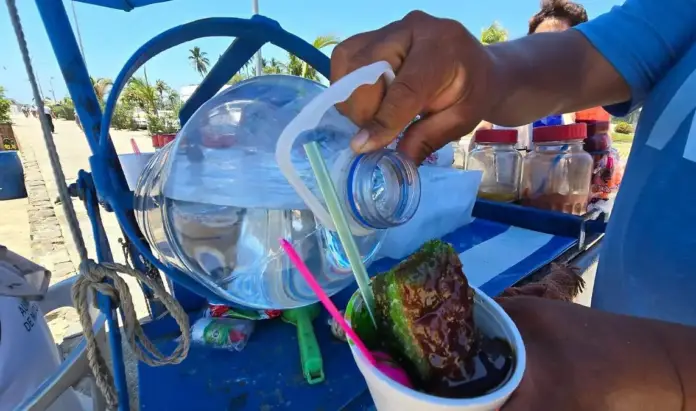In the midst of the hot season, the consumption of drinks such as raspados, agua fresca, and sugary products becomes a constant on the streets, in schools, and in homes in Guerrero. However, far from providing hydration, these products pose a risk to public health, especially for children and adolescents.
When asked about the issue, Samanta Alejandra Casiano Bibiano, a graduate in Nutrition and Food Science, warned that these drinks “are not recommended” due to their high content of simple sugars and empty calories.
“They are products that refresh you for a moment, but they are full of sugar. Even if they are made from natural fruit, they are not safe. Excessive consumption is linked to obesity, type 2 diabetes, insulin resistance, and other conditions,” she explained.
The specialist emphasized that the best way to hydrate remains plain water, as a secondary and occasional option. She recommended beverages with non-caloric sweeteners or sugar-free electrolytes, although she insisted that their consumption should be sporadic, giving the example that consuming them every three days might not affect your health.
“You can choose a zero electrolyte, with sweeteners, but not for daily use. Frequency is key. Ideally, prepare homemade drinks with water, salt, minimal sugar, and lemon or cucumber juice, which rehydrate without harming you,” she noted.
With the implementation of front-of-package labeling by the Ministry of Health, Casiano Bibiano emphasized the importance of identifying labels such as “high in sugar,” “high in calories,” or “with sweeteners,” stating that “If a beverage has any of these labels, it is best to discard it. Choosing products without added sugar is the most recommended, but they should never replace water.”
Acapulco Government Maintains Recommendations for Tourists
CAPTA Strengthens Operations in Beach Areas to Safeguard the Physical Safety of Tourists During Holy Week
The Guerrero nutritionist also warned that high sugar consumption has already begun to take its toll, with an increase in cases of childhood diabetes and chronic diseases. “Mexico is among the top countries in childhood obesity. If no action is taken, the costs for the healthcare system will be extremely high,” she warned.
Regarding the Federal Government’s initiative to regulate products sold in schools, our interviewee considered it an important step forward that should have been implemented years ago.
“It’s a wise measure. Children are beginning to identify what is healthy. Little by little, they themselves will replicate these habits at home. Now we need to strengthen nutritional guidance in homes and have nutritionists in schools providing appropriate guidance.”
So she hopes it will become a turning point in the health culture that children will take home and begin to raise awareness among older and new generations.

Source: oem




